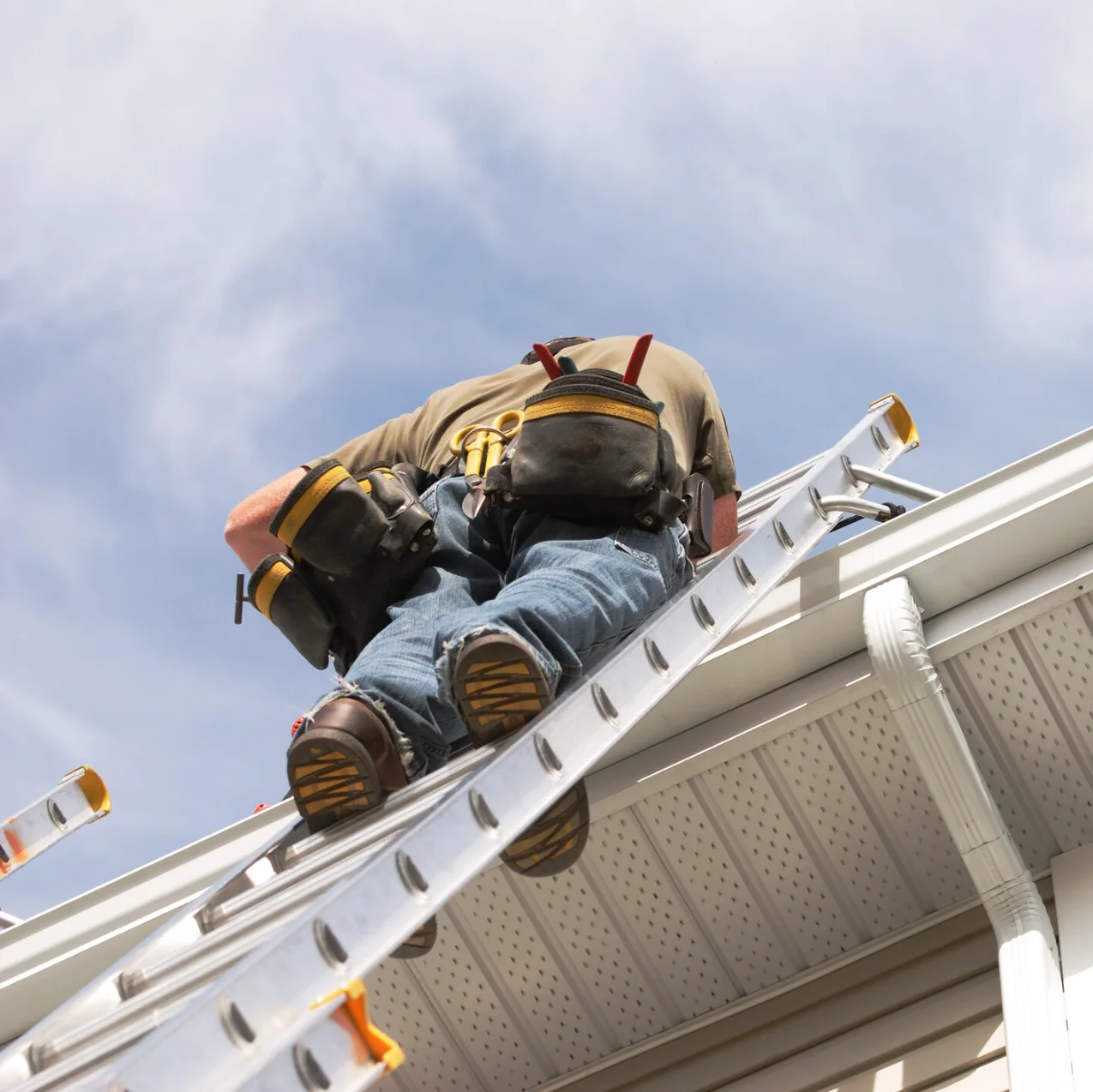If you or a loved one has been injured in a work-related ladder accident in California, Attorney James Koh can help you pursue workers’ compensation benefits for your ladder accident injuries. Call our law firm at 213-232-2725 to schedule a consultation today.
According to the Centers for Disease Control and Prevention (CDC), ladder accidents result in more than 100 deaths and thousands of injuries each year in the U.S. Although certain environments, behaviors, and other factors increase the likelihood of falling off a ladder, the reality is that these devastating accidents can occur even when workers take all of the necessary precautions.
If you’ve suffered injuries in a work-related ladder accident, you may be wondering how to access your workers’ compensation benefits for missed wages and medical expenses, or if you’re even eligible to do so. Luckily, you don’t have to navigate workers’ compensation law alone — Attorney James Koh is here to help.
This article will explore the nature of work-related ladder accidents, including common causes, resulting injuries, and how a dedicated workers’ compensation attorney can help you secure the benefits you deserve.

Common Causes of Ladder Accidents
Ladder accidents occur for a wide variety of reasons, and determining the cause of your ladder accident will be important to securing workers’ comp benefits. Though not an exhaustive list, we detail some of the most common causes of ladder accidents below.
Improper Ladder Selection
Improper ladder selection poses a significant risk in workplaces that require frequent ladder use. While selecting a ladder that is too short for the intended task may lead to overreaching and loss of balance, selecting a ladder with insufficient weight capacity can result in structural failure. Moreover, choosing the wrong type of ladder for the specific job, such as using a step ladder when an extension ladder is needed, can compromise stability and increase the likelihood of accidents.
Poor Ladder Placement
Poor ladder placement further compounds the risk of accidents in work environments. Placing ladders on unstable or uneven surfaces, such as slippery floors or soft ground, compromises their stability and increases the likelihood of tipping or shifting during use.
Additionally, failing to secure the ladder properly, such as not engaging locking mechanisms or using stabilizing devices when necessary, can further exacerbate the risk. Proper training and adherence to safety protocols are essential to ensure that workers understand the importance of stable ladder placement and take necessary precautions to minimize hazards in their work environment.
Moving Heavy or Bulky Items
Carrying heavy or bulky items while climbing ladders introduces additional challenges and hazards. Workers may struggle to maintain balance and stability while ascending or descending, increasing the risk of falls and injuries. Moreover, carrying items that obstruct visibility or impede movement can further compromise safety. Employers should emphasize the importance of using proper lifting techniques and provide alternative methods for transporting tools and materials to elevated work areas to reduce their employees’ risk of falling.
Lack of Proper Training
Not everyone is experienced in proper ladder techniques and safety protocols. Workers who aren’t used to using ladders for work may lack the knowledge and experience needed to safely utilize ladders, resulting in injuries. Employers have a responsibility to make sure their employees have been trained to use ladders safely and responsibly while performing their work-related duties.
Environmental Factors
When ice and slick surfaces are involved, ladder safety becomes crucial. Standards outlined by the Occupational Safety and Health Administration (OSHA) explicitly say that ladders should never be used in snow or ice unless completely necessary. If your employer decides to ignore OSHA standards and instructs you to get on a ladder during unsafe conditions, they may be held liable for resulting injuries. Regardless of fault, employees injured in work-related ladder accidents should be able to access workers’ comp benefits.
Distractions
Construction sites and other job sites where ladders are frequently used are usually filled with distractions, and this can lead to unexpected injuries. For example, you may be on a ladder and reaching for something when a co-worker decides to toss a tool to you. While leaning over, you try to catch it, causing you to lose your balance and fall from the ladder onto the concrete below. Such accidents can have lifelong consequences and can even result in death.
Common Injuries in Ladder-Related Accidents
Work-related ladder injuries are unfortunately common across various industries and occupations. Ladders are frequently used by construction workers, maintenance crews, cleaning staff, and many other laborers, and when used improperly, they can lead to serious injuries such as broken bones, head injuries (including concussions and traumatic brain injuries), back injuries (including spinal cord injuries), and even fatalities. Additional work-related ladder injuries include:
- Strains and sprains. Workers may experience strains or sprains from awkward postures or movements while climbing, reaching, or descending from ladders. This can happen when workers try to carry heavy objects up or down the ladder or when they lose their balance.
- Impact injuries. Impact injuries can occur if a falling ladder or object strikes a worker or if a worker collides with a stationary object while on the ladder.
- Electrocution. When working near electrical wiring or equipment, using a metal ladder can pose a risk of electrocution if it comes into contact with live wires.
If you or a family member suffered injuries in a ladder accident at work, you can pursue benefits through a workers’ compensation claim. However, accessing these benefits is sometimes difficult without legal assistance. A trusted ladder accident lawyer can help you secure the financial assistance you deserve.
Eligibility for Workers’ Compensation in Ladder Accidents
Simply put, if you are an employee (not an independent contractor) who has sustained any type of work injury (including ladder injuries), you will almost certainly be entitled to workers’ compensation. However, you may become disqualified from workers’ compensation benefits if your injuries were not sustained while performing your job-related tasks.
For example, let’s say that Marcell is a roofer and loses his balance while carrying some shingles up a ladder, ultimately falling and breaking his wrist. In this case, Marcell was performing the typical duties required by his position and would be entitled to workers’ comp benefits. However, if Marcell and some friends went back to the construction site for a few beers and he fell off the ladder while carrying a six-pack, he would not be entitled to workers’ comp. To be eligible, you need to be at work, on the clock, and performing typical duties.

Types of Workers’ Compensation Benefits
If you’re pursuing a workers’ comp claim for a ladder accident at work, it’s important to remember that several types of workers’ comp benefits may be available to you. If you suffer work-related injuries in California, you may be able to access the following:
- Medical benefits. Workers’ compensation typically covers medical bills related to the injury, including hospital stays, surgeries, doctor visits, prescription medications, physical therapy, and other necessary medical services.
- Lost wages. If the injury prevents the worker from returning to work or requires time off for recovery, workers’ compensation can help. These benefits often cover a percentage of the worker’s lost wages, usually around two-thirds of their average weekly wage, although this can vary by jurisdiction.
- Temporary disability benefits. If your injuries leave you unable to work for a limited time while you recover, temporary disability benefits may be available. These benefits can provide you with financial support until you return to work.
- Permanent disability benefits. If your injuries result in permanent disability, workers’ compensation may compensate you for the permanent loss of earning capacity or impairment. The amount of these benefits typically depends on the extent of the disability and other factors.
Lastly, you don’t have to be an injured worker to receive workers’ compensation benefits. Family members of workers who are incapacitated or killed in ladder accidents may also be eligible to receive workers’ compensation benefits on behalf of their loved ones.
Can I Sue My Employer (or Family Member’s Employer) for a Ladder Accident?
California is a no-fault state, meaning that injured workers are eligible to receive workers’ comp benefits regardless of fault. In exchange for this access to benefits, employees are typically restricted from suing their employer after an injury. However, there are exceptions.
If your workplace injuries were caused by employer negligence, you may be able to pursue damages through a personal injury lawsuit. This type of legal action may provide you with compensation that exceeds workers’ comp benefits. If you’ve already filed a workers’ compensation claim, you probably won’t be able to sue your employer unless one of the following is true:
- The ladder accident was caused on purpose by your employer or a co-worker.
- Your employer committed fraud by lying about your workers’ compensation case.
- Your employer doesn’t have workers’ compensation insurance.
Before initiating legal action, we encourage you to discuss your ladder accident with James Koh to determine your options and chart the best course forward.

How to Get Compensation for a Ladder Accident on the Job
As with all workplace injuries, the primary concern is your health. Before thinking about compensation, make sure to seek medical attention for any type of workplace accident injury—even if it doesn’t seem severe at first.
Next, contact your employer to let them know about the accident. Ideally, they will provide you with the necessary paperwork to file your claim, but if not, you can find it on the California Department of Industrial Relations website. Once your claim is received, you’ll be contacted by an insurance representative assigned to your case.
After alerting your employer to your injury, it’s a good idea to speak with an experienced workers’ comp attorney about your ladder fall accident. Your attorney can provide invaluable legal advice about how to maximize your benefits and protect your future.
Hire a California Workers’ Compensation Lawyer for Your Ladder Accident
It’s no secret that insurance companies — including workers’ comp insurers — aren’t always ethical in assessing claims. Even when they do play fair with claimants, the reality is that insurance companies have an incentive to minimize their payouts, even when injury victims are in desperate need of help.
Regardless of your specific situation, a workers’ compensation lawyer can help you manage paperwork, meet deadlines, and even communicate with employers or insurance representatives on your behalf. If you’re ready to get started, call Attorney James Koh at 213-232-2725 for help securing the workers’ comp benefits you need and deserve to recover.
Contact Us
If you or a loved one have been injured in an accident, whether at work or elsewhere, contact us to handle your personal injury and workers’ compensation claims.